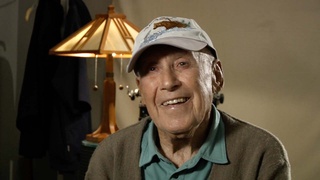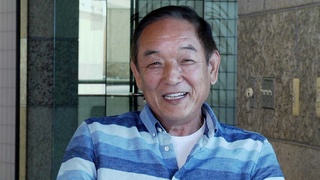Interviews
Didn’t speak Japanese until moving to Japan
At the time I never, never spoke Japanese in Minot, I don’t remember talking, yeah in Japanese, or…we always conversed in English and so until we landed in Yokohama and then even then you know, I don’t know, I was looking at my brother and, you know I think I remember saying something like, oh my! Oh my! Hunk of baloney or something. [laughs] Yeah, and then at the boat, my uncle came up to the deck, you know came up, and then he asked, I guess he asked in Japanese, are you Suto? And I remember I answering yes, and you know that’s [laughs] yeah, that the first conversation, yeah, that I had in [with] Japanese people we had, in Japanese.
Date: June 17, 2008
Location: California, US
Interviewer: Janice Tanaka
Contributed by: Watase Media Arts Center, Japanese American National Museum
Explore More Videos

Learning Japanese with the MIS
(1916 - 2013) Member of the U.S. Military Intelligence Service

Great grandfather working in Hawaii
(b. 1952) Former banking executive, born in Hawaii

Grandfather raised in the hotel business
(b. 1952) Former banking executive, born in Hawaii

Respecting the will of a five-year-old daughter (Japanese)
(b. 1925) War bride

First impression of America (Japanese)
Shin Issei – owner of izakaya (Japanese-style tavern) and kappo (small Japanese diner) restaurant, Honda-Ya

Longing for a life abroad and getting a chef’s license (Japanese)
Shin Issei – owner of izakaya (Japanese-style tavern) and kappo (small Japanese diner) restaurant, Honda-Ya

Support from Nikkei (Japanese)
Shin Issei – owner of izakaya (Japanese-style tavern) and kappo (small Japanese diner) restaurant, Honda-Ya

Immigration ship Brazil-maru (Japanese)
Shin Issei – owner of izakaya (Japanese-style tavern) and kappo (small Japanese diner) restaurant, Honda-Ya

Great grandfather Asato was a sumo wrestler
Okinawan American whose parents are from Peru.

Grandfather loved to tell her stories of her great-grandfather Arakaki
Okinawan American whose parents are from Peru.

Parents leaving Peru to move to California
Okinawan American whose parents are from Peru.

Adjustment to American life
(b. 1938) Japanese American. Hiroshima atomic bomb survivor

Grandfather migrating to Colombia
(b.1974) Japanese Colombian who currently resides in the United States

Immersed in Japanese culture and language
(b. 1936) Japanese Peruvian incarcerated in Crystal City

What made your parents decide to move to Brazil?
Professor of Law, University of Sao Paulo, Lawyer, Translator (b. 1948)
